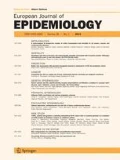Abstract
Aim: To study the effect of a lottery incentive on questionnaire response rate. Material and methods: In Copenhagen County, Denmark, a random sample of 2543 men and women between the ages of 19 and 60 were randomised into a control group and an intervention group. Both groups were contacted by mail and asked to complete a questionnaire on sociodemografic characteristics, self-rated health and self-reported physical activity level. The intervention group was offered participation in a small lottery for returning the questionnaire. No incentive was offered to the control group. Main results: The final response rate for the control group was 60.4 and 63.4% for the intervention group. Although the response rate was significantly higher in the intervention group after 2 and 3 weeks, the difference in the final response rate between groups was not statistically significant (p = 0.12). There was no statistically significant difference between groups in sociodemografic characteristics, self-rated health or self-reported physical activity level. Conclusion: A lottery incentive had no significant effect on the overall response rate, but may have contributed to a quicker response. Furthermore a lottery incentive did not seem to alter the selection of respondents.
References
Johansson L, Solvoll K, Opdahl S, Bjorneboe GE, Drevon CA. Response rates with different distribution methods and reward, and reproducibility of a quantitative food frequency questionnaire. Eur J Clin Nutr 1997; 51: 346–352.
Kalantar JS, Talley NJ. The effects of lottery incentive and length of questionnaire on health survey response rates: a randomised study. J Clin Epidemiol 1999; 52: 1117–1122.
Marret LD, Kreiger N, Dodds L, Hilditch S. The effect on response rates of offering a small incentive with mailed questionnaire. Ann Epidemiol 1992; 2: 745–753.
Clark TJ, Khan KS, Gupta JK. Provision of pen along with questionnaire does not increase the Response rate to a postal survey: A randomised controlled trial. J Epidemiol Commun. Health 2001; 55: 595–596.
Roberts PJ, Roberts C, Sibbald B, Torgerson DJ. The effect of a direct payment or a lottery on questionnaire response rates: A randomised controlled trial. J Epidemiol Commun Health 2000; 54: 71–72.
Picavet HJS. National health surveys by mail or home interview: Effects on response. J Epidemiol Commun Health 2001; 55: 408–413.
Author information
Authors and Affiliations
Rights and permissions
About this article
Cite this article
Aadahl, M., Jørgensen, T. The effect of conducting a lottery on questionnaire response rates: A randomised controlled trial. Eur J Epidemiol 18, 941–944 (2003). https://doi.org/10.1023/A:1025826921030
Issue Date:
DOI: https://doi.org/10.1023/A:1025826921030

